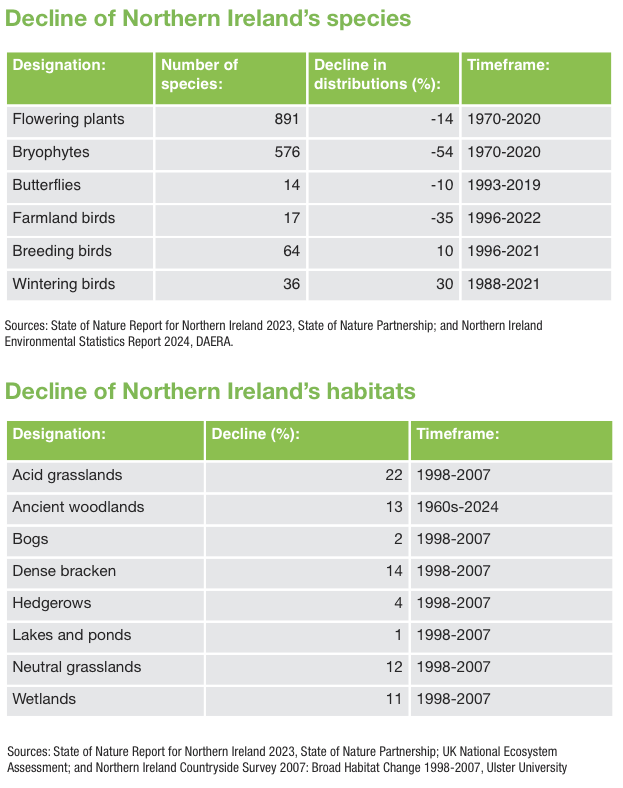OEP: Agri-industry leading driver of biodiversity decline

In October 2024, the Office for Environmental Protection (OEP) published its inaugural broad-ranging report on the challenges facing nature in Northern Ireland, making recommendations to reverse the decline in biodiversity and protect the environment.
“Current pressures on nature in Northern Ireland are unsustainable and urgent action is needed to protect and improve the environment,” asserts the OEP. This aligns with an Assembly motion, tabled by the SDLP’s Patsy McGlone MLA and passed in May 2024, declaring an ecological and biodiversity crisis.
In this context, the OEP has presented Drivers and Pressures Affecting Terrestrial and Freshwater Biodiversity in Northern Ireland to the Northern Ireland Assembly. The 128-page report identifies and assesses the challenges associated with the sectors of the economy, “with a view to helping government and other priorities and drive action towards solutions that will protect and improve the natural environment”.
In examining the root causes of biodiversity loss, the report identifies two primary drivers, both “closely linked with agricultural intensification”:
1. land use change; and
2. pollution.
As per the report, the current manifestation of the agri-industry is “making unsustainable demands on the environment”. However, the OEP emphasises that, despite their economic predominance, “responsibility for nature’s decline does not rest solely with agri food businesses”.
Over 75 per cent of Northern Ireland’s total land area is utilised for agricultural purposes. Amid agricultural expansion, in recent decades seminatural habitats have become increasingly fragmented or been destroyed entirely. Simultaneously, agricultural practices have increased intensity and productivity, necessitating greater volumes of nutrients.
As such, the Office concludes that “agriculture is the activity that contributes most to biodiversity loss,” and the current format of the industry is “unsustainable”.
Further land use challenges identified by the OEP include the expansion of housing, industry, tourism, transport infrastructure, and energy production. Likewise, chemical pollution from spectrum of sources, not least industry, waste management, contaminated land, and sewage is identified as a “ubiquitous problem”.
However, there have been no comprehensive assessments of urban and rural development or the large-scale impacts of chemical pollution on biodiversity.
Alongside nutrient runoff from agricultural processes, sewage is the form of pollution having the most significant impact. Further drivers contributing to biodiversity loss include waste management, resource extraction, urban development, and chemical pollution.
The average material footprint of an individual in Northern Ireland is 16.6 tonnes. Informed by energy consumption, resource extraction, food production, and waste generation, this a disproportionate figure equating to three times more than “that needed to live sustainably”. With ecological footprint closely aligned with material footprint – but also incorporating impacts on environment and biodiversity – the Office has determined that based on available evidence, both footprints are unsustainable.
Recommendations
In response, the OEP has identified three areas for priority action:
1. reducing nutrient pollution via agricultural runoff and sewage;
2. changing land use to restore habitats and implementing nature-positive land use change; and
3. reducing material and ecological footprints (via extraction, consumption, and disposal).
Furthermore, the OEP asserts that “unless action is taken immediately” on the above priorities, the existing challenges will become more entrenched. To this end, the Office advises that the Executive:
• adopts an adaptive management approach for iterative implementation, monitoring, and learning;
• ensures coherence between actions to address cross-sectoral challenges;
• develops clear comprehensive implementation plans to coordinate resources and align actions;
• addresses knowledge gaps; and
• develops a framework for monitoring, evaluation, and learning around outcomes-based targets.
Lough Neagh
Emphasising that the “chronic deterioration” of Lough Neagh has forced the long-term consequences of environmental neglect into the public discourse, the OEP indicates that there are several solutions at our disposal. The first is the relatively simple yet expensive improvements to wastewater treatment. The second is more embedded in that it requires change in farming practices against the interest of agri-businesses.
In many ways, Lough Neagh epitomises the broader challenges facing the environment and is the a “visible test of the solutions and the [Executive’s] actions and intent”. Indeed, it is referred to in the report as “the canary in the coalmine”. Inaction will result in significant socioeconomic costs. These costs, the Office suggests, “should weigh more heavily in decision-making”.

Conclusion
In its conclusion, the OEP determines that the challenges to biodiversity in Northern Ireland are “not distant threats”. Rather, they have pushed several species to their existential brink and have destroyed “globally important habitats”. This, it says, will result in a “less certain and prosperous future”.
For many of these challenges, the report summarises, there is sufficient evidence to begin taking action. The new Environmental Improvement Plan (EIP), published in September 2024 is a critical framework for the delivery of the Office’s recommendations which “should provide a clear vision and the ambition to drive action to reverse the decline in biodiversity and ensuring the protection and enhancement of the natural environment”.
Reaction
In the foreword to the report, OEP chair, Glenys Stacey, says: “More and more has been demanded of the environment over many years, and it is now clear that more pressure has been applied than the land and water can bear.
“Government must act urgently and decisively, not only to reverse a lifetime of environmental degradation and to restore the diversity of Northern Ireland’s habitats and species, but also to ensure a sustainable agri-food industry and wider economy.”
Responding to the report, Minister of Agriculture, Environment and Rural Affairs, Andrew Muir MLA says: “We must change practices which contribute to the loss of our valuable habitats. Recommendations ranging from reduction of pollution from both agriculture and sewage, as well as changing land use to increase biodiversity in rural and urban areas are unsurprising.
“The agriculture sector is already making moves towards addressing many of the issues in this report, and we as [an Executive] must continue to provide both the right policies and financial support to place us on the correct path to reverse environmental degradation.”
However, the Ulster Farmers’ Union (UFU) has reacted angrily to the report, accusing it of taking “another swipe at local farmers” and suggested the document calculated to “damage the public’s perception of farmers”.
UFU deputy president John McLenaghan insists that farmers are not being recognised for the work they undertake to “positively manage and protect nature” while the report fails to reference agriculture as “one of the most successful industries” in the region.
“It is so easy to point out the problems as demonstrated by this OEP report, but where are the solutions?” he asks, adding: “Our farmers manage 77 per cent of the land locally making them an easy scapegoat for society’s problems.”





